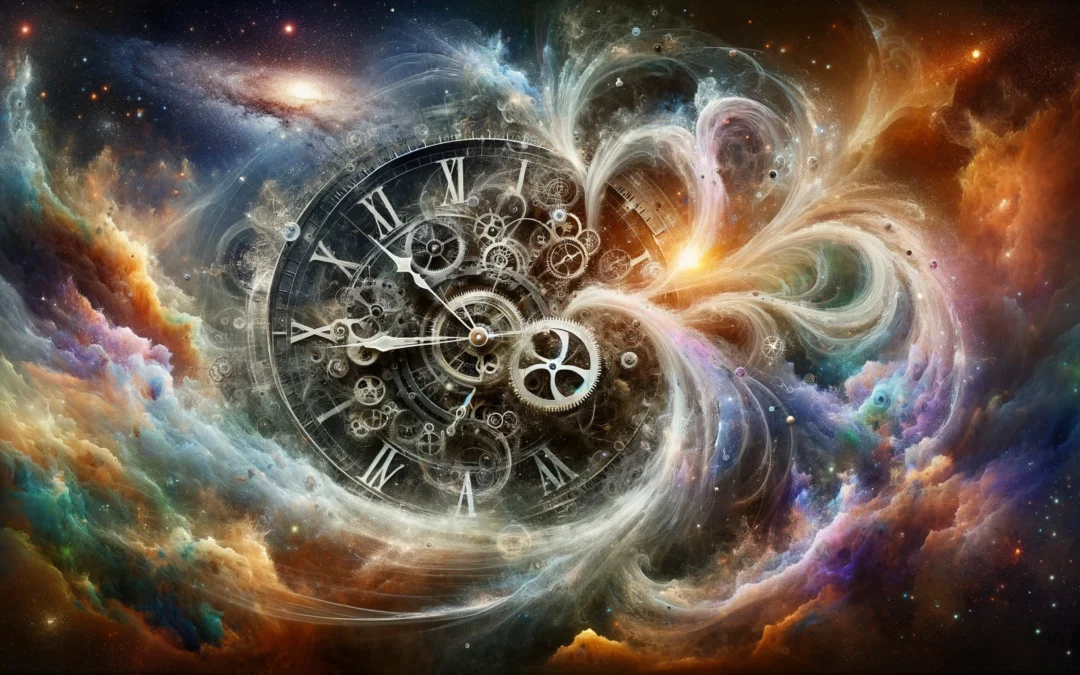In the ever-evolving realms of philosophy and science, the nature of time has been a subject of deep contemplation and debate. This profound inquiry stretches from the ancient musings of Aristotle to the revolutionary theories of Einstein, situating itself at the nexus of physics, philosophy, and human cognition. It challenges our core understanding of reality, prompting us to question whether time truly exists or if it’s merely an illusion crafted by human consciousness.
The Classical Argument for Time’s Reality
On one side of this debate, many assert that time is as fundamental to the cosmos as space or matter. This perspective finds its roots in classical physics, where time is viewed as a distinct, measurable dimension, intricately linked with the three spatial dimensions.
In the realm of physics, particularly within Einstein’s theory of relativity, time is not just a theoretical construct but a real, quantifiable entity. Events occur in a sequential manner, and this sequence is measurable in terms of duration. The concept of spacetime, a cornerstone of modern physics, merges the dimensions of time and space, further solidifying time’s role in the very fabric of the universe.
Human experience also appears to support the existence of time. We perceive time as a continuous stream, a succession of moments through which we navigate life. Our existence, marked by the cycles of day and night and the progression of seasons, seems to revolve around the passage of time.
The Counterargument: Time as an Illusion
Contrastingly, some theorists argue that time is nothing more than a mental construct, an illusion born of human consciousness. Philosophically, time could be perceived as a framework developed to make sense of our experiences. In this view, time is not an external, independent entity but a perception or a measure created by the human mind.
Quantum mechanics, with its non-linear, non-sequential nature, offers an intriguing perspective that challenges the traditional notion of time. In the quantum realm, particles exist in a state of superposition, capable of being in multiple states simultaneously, which defies the conventional understanding of temporal sequence.
The Quantum Argument and Partial Observation Theory
Delving deeper into quantum mechanics, the Partial Observation Theory presents a fascinating twist in our understanding of time. According to this theory, particles can retroactively ‘change’ their states upon observation. If an observer begins to measure a particle’s state midway through its course, the particle appears to ‘go back in time’ to adopt a behavior consistent with the observation. This phenomenon suggests a complex, perhaps bidirectional nature of time, contradicting the straightforward, arrow-like progression of time as perceived in classical physics.
Eternalism and the Block Universe Theory
Adding another layer to the debate is the concept of eternalism or the block universe theory previously explored. This philosophical stance posits that all points in time—past, present, and future—exist simultaneously. In this view, time is an illusion since every moment is equally real and extant, challenging the idea of a flowing, dynamic time.
Time as an Emergent Phenomenon
Seeking a middle ground, some theorists propose that time might be an emergent property. This perspective posits that time does not exist fundamentally but emerges from more basic physical processes. It attempts to bridge the gap between the discrepancies of classical and quantum physics in understanding time.
In this view, time could be akin to a property that manifests at macroscopic levels from the interactions of particles and fields. Similar to how temperature emerges from the movement of particles, time might arise from the entanglements and interactions within quantum fields.
Conclusion: The Timeless Enigma Continues
The debate over the nature of time remains a profound and unresolved puzzle, reflecting the challenge of harmonizing human perception with the nuances of physical laws. Whether time is a fundamental part of the universe, a mental construct, an emergent phenomenon, or even a non-linear entity as suggested by quantum mechanics, its exploration continues to push the boundaries of our understanding of reality.
As we delve further into the quantum realm and refine our philosophical interpretations, the nature of time stands as one of the most captivating enigmas. It spurs the wheels of scientific and philosophical inquiry, perpetually driving us to explore, question, and marvel at the intricate tapestry of the universe we inhabit. With each new discovery and theory, we inch closer to unraveling this timeless mystery, yet it remains an elusive and endlessly fascinating topic, echoing through the corridors of human thought and inquiry.










